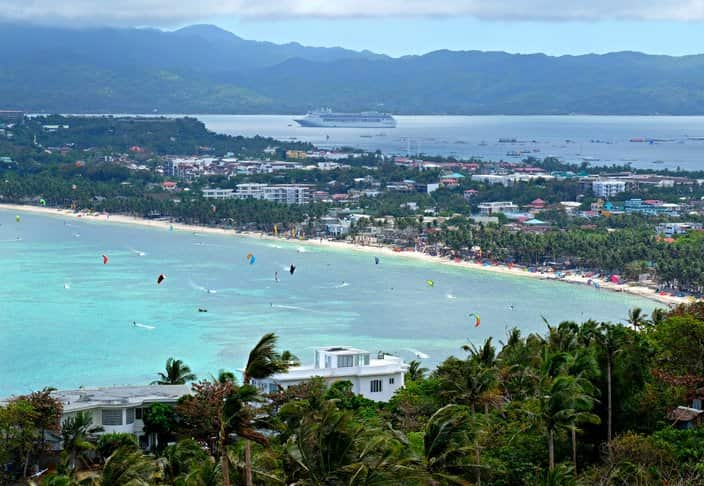As the central Philippine island resort of Boracay prepares to bar tourists for six months, residents fear the militarisation of the popular tourist hotspot as President Rodrigo Duterte vows to clean up what he calls an environmental “cesspool.”
Mr Duterte ordered the closing of Boracay early this month, saying that the water around the tiny island “smells” and that it poses a danger to people’s health.
With tourism the main source of income for its estimated 40,000 inhabitants, Mr Duterte’s assertion threw the island, famed for its fine, white sand beaches, into disarray. Last year the island drew a record two million tourists who spent about 56 billion pesos (more than $1 billion).
But the scramble for tourist dollars has also fuelled rapid development, which has taxed the island’s fresh water supply, power grid and systems for disposing of sewage and other waste.
Nenette Graf, president of the Boracay Foundation, which represents hotels, restaurants and other businesses, said Mr Duterte’s threat prompted a feverish drive to clean up the island and penalise establishments that violate environmental rules.
“We humbly plead for the lives and families of direct and indirect workers” who will suffer economically from the shutdown, she said.

Mr Duterte’s tirade was apparently set off by a video of blackened water gushing from a runoff pipe that drains into seas off Bulabog Beach, on the island’s eastern shore, as a kite surfer passed in the background. Mr Duterte then ordered environmental, tourism and interior department officials to undertake a huge cleanup.
On Wednesday, the Boracay Foundation called on Mr Duterte to speed up the release of public “calamity funds” to help people adversely affected by the closing.
“We have done our best to look for ways to soften the impact of this looming six-month closure, especially for our workers who look upon us for support in this time of confusion and uncertainty,” said Ms Graf, who runs the Boracay Beach Resort.
Under the guidelines coming into force on Thursday, the government is barring local and foreign tourists on the island, while workers on Boracay must have government identification cards.
All island residents must also be able to show their credentials, and resort or hotel owners must show “proof of ownership.” Foreigners who are long-term residents of Boracay need to have been properly vetted by immigration officials.
Fernando Hicap, leader of the fishermen’s rights group Pamalakaya, criticised what he called a “militarisation” of Boracay.
The 630-man Joint Task Force Boracay — which includes the police, military and coast guard — has been patrolling shores since the start of the week. Photos of the group conducting the patrols and anti-riot drills have made the rounds on social media, alarming some island residents.
“President Duterte never disclosed to the public that his supposed rehabilitation plan includes deployment of police forces in a full battle gear,” said Mr Hicap, a former congressman. “We can’t see the point of militarising the tourist island but to sow intimidation and curtail civil rights of the residents who stand affected by the six-month closure.”
His group — along with a civic organisation, the Kalikasan People’s Network for the Environment — is alarmed by reports that during the closing the state casino company is to begin construction of a casino by the Macau-based Galaxy Entertainment Group on the island.
“How could it be a massive cleanup if you will construct a mega-casino and other giant businesses along the shoreline of Boracay?” Mr Hicap said.
Mr Duterte said he opposed any plans to build a casino on Boracay.
“I do not have any plans” for a casino there, he said. “My order was to clean it up. So they should clean up.”
But Galaxy’s Philippine partner in the project, Leisure & Resorts World Corp., has said that talks to build a casino on Boracay were underway and that it had not abandoned the project.



